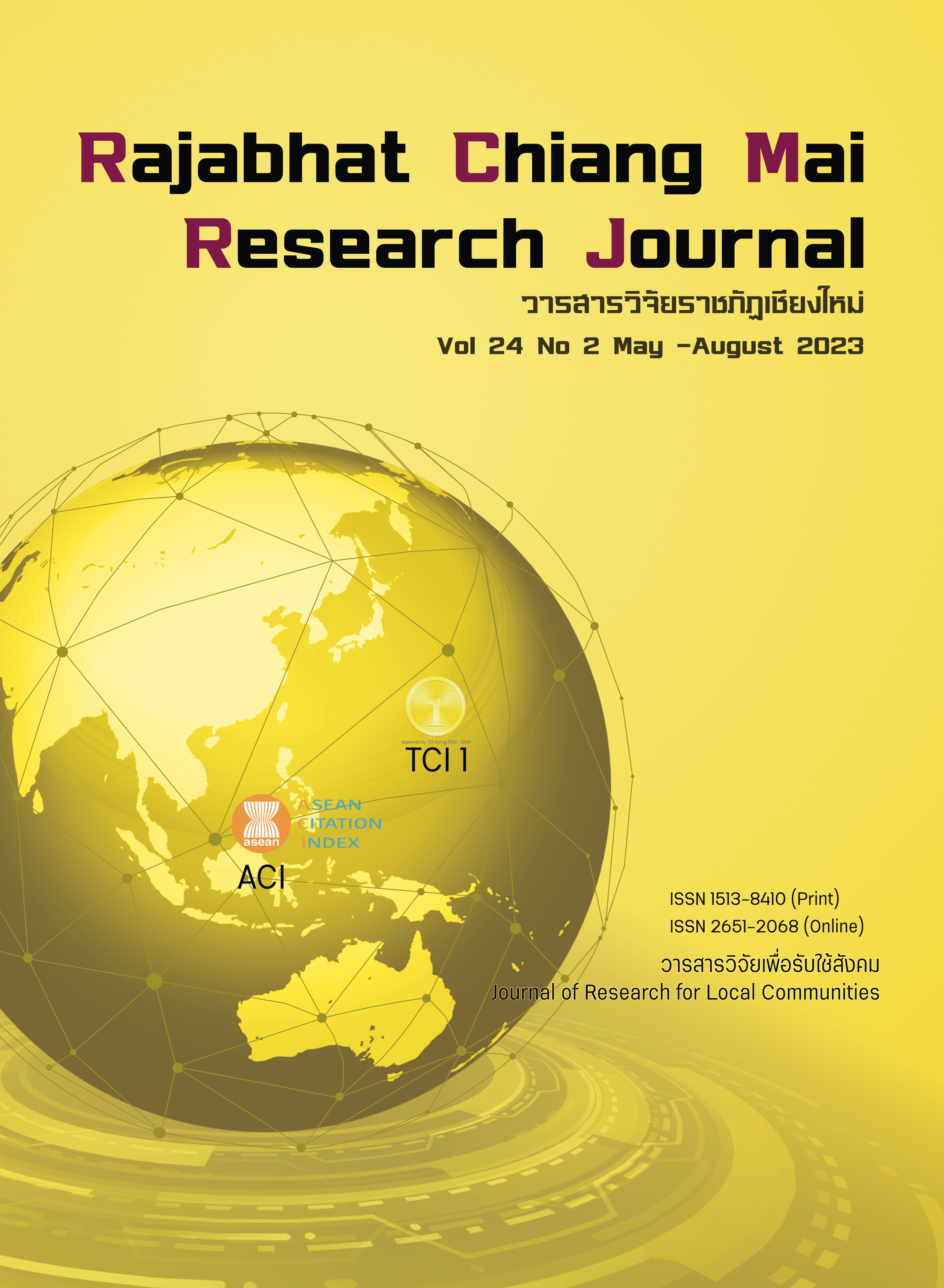Development of Bilingual Teaching Models According to Multicultural Education Approaches Using English and Ethnicity Language
DOI:
https://doi.org/10.57260/rcmrj.2023.263046Keywords:
Bilingual teaching, Multicultural education, Ethnic language, Multicultural society, Non-formal educationAbstract
According to the multicultural approach, educational administration aims to assist students in embracing and appreciating both their own culture and other cultures that are different from their own. It encourages pride in one's own culture, pride in discovering other cultures, and pride in knowing how to use information wisely. Every learning center has to offer multicultural education because, if students and educators don't learn about cultural variety through the learning center's activities, they can elsewhere in society. The goal of the project is to create bilingual teaching models employing English and language ethnicity at the Office of Non-Formal and Informal Education in the Samoeng district of Chiang Mai Province. The research methodology was conducted using developmental research methodologies. As students at the Office of Non-Formal and Informal Education in the Samoeng district of Chiang Mai Province, Thailand, come from a variety of ethnic backgrounds and each ethnic group has its own distinctive cultural traditions and ways of life, the research findings showed that where everyone will learn about the diversity of cultures present in society, it is essential to successfully manage teaching and learning in English classrooms that meet the needs of many students. Findings can be used to the delivery of education for multicultural schools in order to support equity in education in line with the concept of multicultural education. This involves managing learner differences. The unique aspect of this study is the creation of a bilingual teaching model based on a multicultural education approach using ethnic languages and English, in terms of learners' English classroom proficiency that will affect academic achievement, and the significance of curriculum development teaching techniques using various techniques, that can assist learners in studying according to their individual language proficiency to achieve better academic achievement.
Downloads
References
Anderson, R, C. (1977). The notion of schemata and the educational enterprise: General discussion of the conference. In Anderson, R. C., Spiro, and Montague 1984. Interest level: academic.
Asher, J. (1982). Learning Another Language Through Actions: The Complete Teacher’s Guidebook. (2nd ed.). X Sky Oaks Production, Inc.
Assalihein, S. (2010). Effects of Religion Based on Multicultural Education Concepts on Learning Achievement of Prathomsuksa 5 Students. Graduate School, Islamic University Yala. (In Thai)
Bandura, A. (1977). Social learning theory. Englewood Cliffs, NJ: Prentice Hall.
Banks, A. Jame. (1994). An introduction to multicultural education. Boston: University of Washington, Seattle.
Banks, A. Jame. (2001). Approaches to multicultural curriculum reform. In J. Banks and C. Banks (Eds), Multicultural education: Issues and perspectives. Boston: Allyn & Bacon.
Benjamin, B. (1971). Hand book on Formative and Summative Evaluation of Student. Learning. New York: Mc Graw-Hill Book Company.
Buadang, K. (2003). Religion Conversion: The Complexity of Karen Identity in Northern Thailand in ethnic identity and marginality. Bangkok: Sirindhorn Anthropology Center. (In Thai)
Chaikan, A. (2018). Teaching Thai as a Second Language For ethnic Khmer children in Thailand. Department of Early Childhood Education, Faculty of Education, Ratchathani University. (In Thai)
Charoensri, C. (2002). Postmodernism and Sociology. Bangkok: Wisali Publishing House.
Cortes, Jr. (1996). Cultural Diversity and Education: Foundations, Curriculum, and Teaching. (5th ed.). Boston: Allyn and Bacon.
Cummins, J. (2001). Bilingual children’s mother tongue: Why is it important for education. Spongiform NR, 19, 15–20 [Electronic version]. Retrieved from http://www.lavplu.eu/central/bibliografie/cummins_eng.pdf
Dewey, J. (1963). Bilingualism in International Schools: A Model for Enriching Language Education. Multilingual Matters Ltd. Clevedon, Toronto.
Malone, S. (2006). Planning Patani Malay Multilingual Education Program in Southern Thailand. Center for Peace Studies and Development. Mahidol University.
Malone, D. (2005). Two-Track Approach to Teaching Children to Read and Writing their First Language (L1). Adapted from Working together for literacy (chapter 3) by Mary Stringer. LinguaLink TM Dallas: SIL International.
Piaget, J. (1980). Oral Language Resource Book. Resource and developed by Education Department of Western Australia. Amazon.co.uk: Books.
Reungsri, S. & Dhedchawanagon, K. (2021). Context and Factors Affecting the Process of Preparing Teachers for Multicultural Classrooms. RMUTL Journal of Business Administration and Liberal Arts 60 Vol. 9 No. 1 January-June 2021. https://so05.tci-thaijo.org/index.php/balajhss/article/view/247575 (In Thai)
Richards, J.C. (2006). Communicative Language Teaching Today. Cambridge: Cambridge University Press.
Sajjawathit, A. (2003). Learner-Centered Philosophy of Education. Bangkok: LT Press.
Sanhachawee, A. (2007). Teach Thai language in terms of language balance. Bangkok: Children Education Association.
Supa, C. & Dhedchawanagon, K. (2022). English Proficiency Development Community-Based Tourism for Non-Formal and Informal Education in Samoeng, Chiang Mai Province, Thailand. International Journal of Social Science and Economic Research, 7(7), 2232-2241. https://ijsser.org/2022files/ijsser_07__151.pdf
Vygotsky, L.S. (1997). Mind in Society: The Development of Higher psychological Processes. Cambridge, MA: Harvard University Press.
Wongrak, C. (2017). The use of mother tongue in teaching English to university students in the Northeast. Ubon Ratchathani: Ubon Ratchathani University Press. (In Thai)
Yothakan, S. (1998). Developing a multicultural education program to promote understanding of Self of kindergarten children in the Northeast. Thesis Master of Education, Major early childhood education Chulalongkorn University. (In Thai)
Downloads
Published
How to Cite
Issue
Section
License
Copyright (c) 2023 Rajabhat Chiang Mai Research Journal

This work is licensed under a Creative Commons Attribution-NonCommercial-NoDerivatives 4.0 International License.
1. Articles, information, content, images, etc published in the “Community and Social Development Journal” are copyrighted by the Community and Social Development Journal, Chiang Mai Rajabhat University. In order to properly distribute the articles through print and electronic media, the authors still hold the copyright for the published articles under the Creative Commons Attribution (CC BY) license, which allows the re-distribution of the articles in other sources. References must be made to the articles in the journal. The authors are responsible for requesting permission to reproduce copyrighted content from other sources.
2. The content of the articles appearing in the journal is the direct responsibility of the article authors. The editorial board of the journal does not necessarily agree with or share any responsibility.














